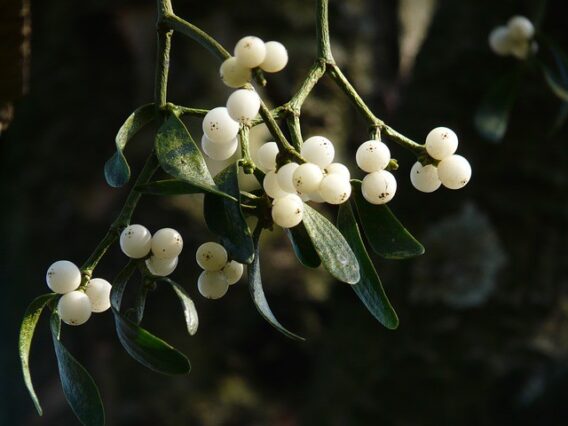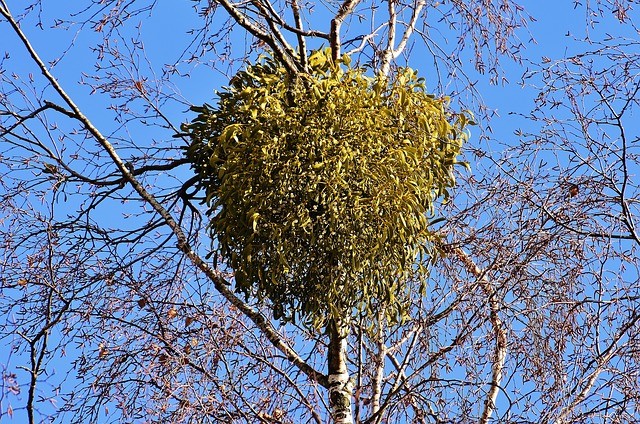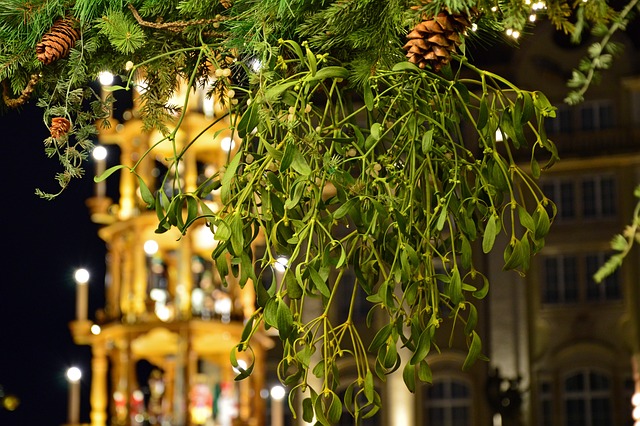Ah mistletoe… this plant has long been associated with the Christmas season, and so has the tradition of kissing underneath it. But what exactly is mistletoe, and why do we have it in our homes at Christmas?

What is Mistletoe?
Mistletoe (Viscum album) is a fascinating plant that has captured the imagination and hearts of people for centuries. As an evergreen parasite, it grows by attaching itself to the branches of various trees, drawing nutrients and water from its host. With its striking green leaves and clusters of white berries, mistletoe adds a touch of natural beauty to the festive atmosphere.
Mistletoe prefers orchard trees like apple, but is also found growing on other species of tree including willow, lime and occasionally oak.
This evergreen plant forms a ball-like structure. It is seen hanging from bare trees in the wintertime, and its pairs of green leaves and white cascading berries are a wonderful display when there is little else blooming. It provides an important habitat for wildlife, and is a source of winter food for birds.

The leaves, stems and berries on mistletoe are poisonous to humans, so if you have it in your home keep it well away from young children and animals!
What does Mistletoe Symbolise?
Mistletoe was used by the Druids as a symbolic plant during the winter solstice, and during the middle ages, it was a custom to hang bunches of mistletoe to bring good luck and ward off evil spirits.
In Norse mythology, mistletoe is symbol of love and friendship and it is thought that is possibly where the kissing tradition came from.
Over time, the tradition evolved, and kissing under the mistletoe became a popular practice during the holiday season. The exact origin of the kissing custom is unclear, but it is thought to have Victorian-era origins. It is said that when two people find themselves under the mistletoe, it is customary for them to share a kiss. It is believed that refusing a kiss would bring bad luck, but a kiss under the mistletoe is said to promote love, friendship, and good fortune.
In modern Christmas festivities, using mistletoe and other evergreen plants as part of our celebrations shows how much older Pagan traditions are still relevant today. It seems there’s just something about fresh evergreen leaves that brings cheer to our homes and spirits in winter.

The significance of mistletoe in Christmas celebrations goes beyond just the romantic gestures it inspires. It is also a symbol of peace, goodwill, and unity during the holiday season. Mistletoe serves as a gentle reminder to spread love and joy to those around us, to cherish the company of family and friends, and to embrace the spirit of togetherness that defines this magical time of year.
So, as we hang mistletoe in our homes during Christmas, let us remember the ancient traditions, the folklore, and the symbolism it holds. Let us embrace the opportunity to share kisses and create cherished memories with loved ones. May the mistletoe bring us warmth, happiness, and the reminder to celebrate the season of love and generosity.
So, if you’re looking for a last minute gift, or if you are visiting friend or relatives over Christmas, try a bunch of mistletoe to wish them well for the new year!
Let’s keep in touch! Add your email for interesting wild things sent to your inbox.
